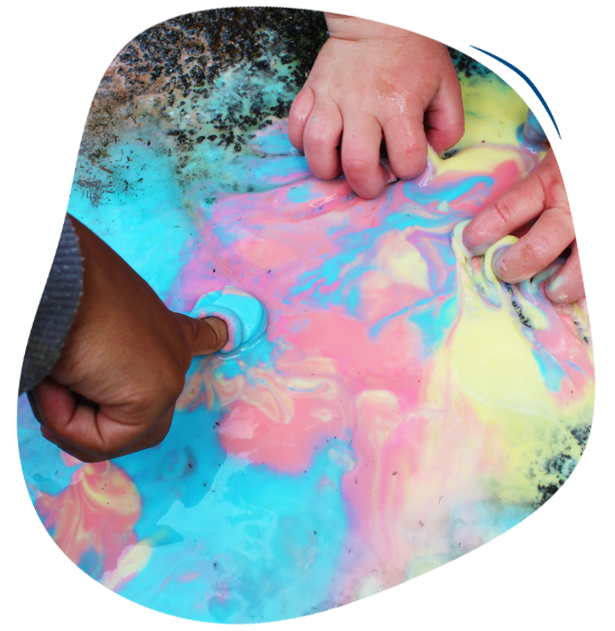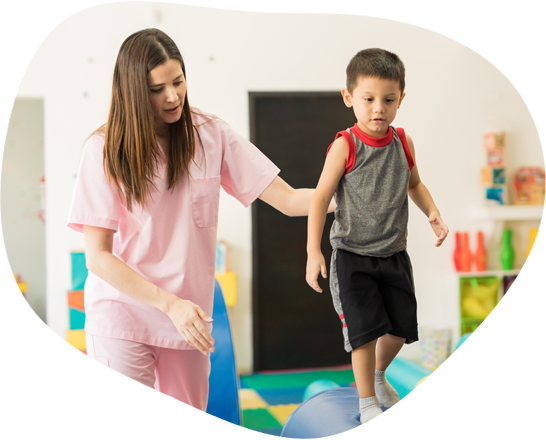
Speech Language Therapy
Birth to school-entry eligibility
Speech Therapists are trained to work with a wide variety of communication challenges through the lifespan. Your Speech Language Pathologist (Therapist) (SLP) will work with your family on all aspects of your child’s communication. Speech therapists at Starbright are registered with the College of Speech and Hearing Health Professionals of BC.
The foundations of communication begin in infancy and are much more than the words they say. Your therapist will assess where your child is in their foundational skills of social interaction, cognition (thinking), play, early listening, early vocal development and understanding of language. These skills are crucial for spoken language to emerge. The words and the clarity of the speech sounds in those words can take time to develop. Your SLP can help determine the type of intervention needed to help foster these skills through a combination of:
- Observation of your child
- Parent coaching and education on typical development
- Assessment – both formal and informal
- Developmental checklists
- Monitoring your child’s development in each area of communication
- Collaboration with other therapists who may also be involved with your child
- Providing suggestions for you to do at home
- Providing suggestions for community programs (daycare/preschool)
- Direct or Play based intervention: Your SLP will partner with you to achieve speech and language goals you develop together.

SLP’s at Starbright can help with a wide variety of communication challenges that include but are not limited to:
- Delayed language
- Delays in play skills
- Delays in social interaction
- Motor planning difficulties (Childhood apraxia of speech)
- Voice disorders
- Hearing loss
- Down syndrome
- Global Developmental Delays
- Autism Spectrum Disorders
- Speech sound development and clarity (how well you and others understand your child)

Occupational Therapy
Birth to school-entry eligibility
Occupational Therapy addresses function and promotes independence through skill development, and adaptation of activities, equipment or the environment. Occupational areas of focus are self-care (activities of daily living), productivity (learning and educational activities) and leisure (play). Occupational Therapy also addresses the functional abilities required for daily living such as, motor, sensory, cognition and psychosocial performance areas. Deficits or delays in these performance areas may be addressed by OT intervention. Occupational Therapists are registered with the College of Occupational Therapy of British Columbia.
Getting To Know Your Child
As a first step the OT may:
- Ask you to share knowledge of your child’s development.
- Observe your child in everyday activities.
- Play with your child.
- Complete developmental checklists.
- Use standardized assessments in selected skill areas.

Occupational Therapists Have A Special Interest In:
- How children use their bodies, especially arms and hands to control and manipulate objects. Consequently, play activities involving the use of fine motor skills are often the focus.
- Children’s visual and perceptual skills; how they coordinate their eyes and hands; and how they manage the space around themselves including how they process and respond to sensory information.
- Play skills – learning appropriate use of toys, learning to play independently and with others.
- Children’s response to learning opportunities and how they best learn and organize activities.
- Children’s interests, coping behaviours, self-image and their ability to pay attention and socialize with others.
- Self care skills such as dressing, toileting, feeding, sleeping and personal hygiene.
- The adaptation of equipment or the provision of technical aids, which may help to maximize independence.
- Safety awareness.
Physical Therapy
Birth to school-entry eligibility
Physical Therapists are registered with the College of Physical Therapists of British Columbia. They use their knowledge of anatomy, neurology and physiology to promote physical development, mobility, and functional independence. This is addressed through everyday activities, play, positioning, handling and/or use of equipment. Physical Therapists work in partnership with families to meet the unique needs of the child and family.
Physical Therapists look at a child’s:
- Strength and muscle control
- Movement of joints
- Balance reactions
- Co-ordination
- Motor skills
Physical Therapists strive to ensure children are active participants in their environments, and can assist families in accessing community recreation programs such as playground activities, swimming, gymnastics and horseback riding. They may recommend specialized equipment such as standers, walkers, seating systems, and orthotics.



Do you believe your young child would benefit from one of the services at Starbright?
Fill out the appropriate referral form and one of our friendly staff will be in touch with you soon.


Clinical Counselling
Birth to school-entry eligibility
The program provides counselling to children and families who are actively involved in other Starbright programs for a variety of reasons. Referrals are made for the child, but the Counsellor works in collaboration with the family to best meet the needs of the child. Children are referred for help for a wide variety of social, emotional or behavioural issues that may be impeding a child’s functioning in their family or learning environments.

